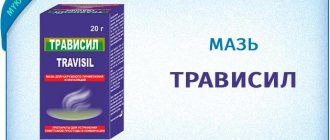Contraindications
The use of Efizol is contraindicated in:
- the patient's tendency to form thrombosis ;
- personal hypersensitivity to active or other ingredients of drugs;
- existing thrombosis ;
- diabetes mellitus;
- diagnosed thrombophlebitis ;
- severe kidney pathologies ;
- sugar intolerance;
- allergic manifestations observed in the anamnesis in relation to quaternary ammonium compounds (in particular benzalkonium chloride );
- under the age of 4 years.
Analogs
Level 4 ATX code matches:
Falimint
Suprima-ENT
Ingalipt-N
Strepsils Plus
Strepsils
Ingalipt
TheraFlu LAR
Hexoral Tabs
Lisak
Angilex
Kameton
Anzibel
Agisept
Yox
Lugol's solution with glycerin
Lugol
Laripront
Stopangin 2A
Stopangin
Septolete Neo
There are many analogues of the drug Efizol, the most famous of which are:
- Coldact;
- Lisak;
- Angi Sept;
- Yox;
- Angilex;
- Decathylene;
- Gripcold;
- Anzibel;
- Ingalipt;
- Agisept;
- Hexalize;
- Kameton;
- Lisobakt;
- Neo-angin;
- Orasept;
- Septolete;
- Strepsils;
- Falimint;
- Hepilor , etc.
special instructions
Since Efizol does not contain an analgesic ingredient, its use for severe sore throat is not advisable.
If the main clinical symptoms of generalized infection , the patient should immediately consult a doctor to decide on the parallel prescription of systemic antibiotic therapy .
If any negative effects associated with taking Efizol are detected, therapy should be stopped immediately.
Combined use with other agents used for local treatment should be carried out with caution and under the supervision of medical personnel.
Vitamin C absorption processes can be disrupted with enteritis , dyskinesia and achylia .
The appointment of Efizol requires caution in cases of diagnosed glucose-6-phosphate dehydrogenase deficiency , as well as previously observed kidney diseases .
Taking ascorbic acid may negatively affect laboratory tests, including determination of plasma bilirubin , glucose , lactate dehydrogenase and transaminases .
Long-term use of ascorbic acid in dosages above 1 gram per day, which significantly exceeds the recommended doses of Efizol, requires monitoring of pancreatic , renal function and blood pressure .
If Efizol is used by patients with urolithiasis, it is necessary to avoid taking ascorbic acid in dosages higher than 1 gram per 24 hours, as this can cause the formation of oxalate stones .
Patients with galactosemia should use Efizol with caution.
Patients with sideroblastic anemia , hemochromatosis , polycythemia , thalassemia and leukemia , due to the increase by ascorbic acid . Patients whose body has an increased concentration of iron should strictly adhere to the dosage regimen.
Patients with high blood clotting should take Efizol in minimal doses.
Side effects
As a rule, treatment with Efizol did not lead to the formation of severe side effects, however, some negative drug reactions characteristic of its active ingredients were identified.
From dequalinium chloride
Digestive system:
- feeling of dryness in the mouth;
- feeling of irritation and/or burning in the throat;
- nausea , vomiting ;
- development of dysbiosis in the oral cavity (in case of prolonged use of high dosages).
Local phenomena:
- development of ulcers and/or necrosis (with abuse and in rare cases).
Other:
- allergic manifestations (in very rare cases).
From ascorbic acid
The cardiovascular system:
- arterial hypertension (hypertension).
Skin:
- eczema formation .
Nervous system:
- feeling of heat;
- increased fatigue / excitability ;
- headache;
- sleep disorders.
The immune system:
- allergic manifestations (including itching / rash ; Quincke's edema ; urticaria ; in case of sensitization - anaphylactic shock ).
Other (when taking high dosages of more than 1000 mg per 24 hours):
- disruption of the insular apparatus (including the development of glucosuria and hyperglycemia );
- disorders of glycogen (up to the formation of diabetes mellitus );
- thrombocytosis;
- myocardial dystrophy;
- hyperprothrombinemia;
- neutrophilic leukocytosis;
- diarrhea;
- erythrocytopenia;
- dysbacteriosis in the oral cavity;
- hemolysis of erythrocytes (in the presence of erythrocyte glucose-6-phosphate dehydrogenase deficiency);
- damage to the mucous membranes of the digestive tract;
- vomit;
- disorders of the glomerular renal apparatus;
- heartburn;
- crystalluria;
- the occurrence of oxalate, cystone and/or urate stones in the urinary tract and kidneys;
- disturbances in the metabolism of copper and zinc ;
- renal failure.
Indications for use
The use of Efisol tablets (for resorption) is indicated:
- for local antiseptic therapy for inflammatory processes of the throat and oral cavity , if they occur due to exposure to pathogenic pathogens (including fibrous, ulcerative, catarrhal gingivitis ; glossitis ; pharyngitis ; candidiasis (thrush); aphthous stomatitis ; laryngitis ; tonsillitis ;
- for the treatment of infectious pathologies of the throat in severe forms (with the parallel use of sulfonamides and antibiotics );
- in order to prevent possible infections in the preoperative and postoperative periods, during surgical interventions in the throat and oral cavity.
Overdose
With a single dose of excessive dosages of Efizol, the occurrence of the above-described side effects (including nausea / vomiting and diarrhea ) was observed.
With prolonged use of high dosages of ascorbic acid, insular apparatus in the pancreas , which requires constant monitoring of its functionality. Also, large doses of vitamin C can cause precipitation of oxalate stones , due to changes in the process of acetylation of uric and ascorbic acids .
Treatment of all negative consequences of overdose should be consistent with the observed symptoms.
Pharmacodynamics and pharmacokinetics
Efizol is a combined medicinal drug with pronounced antiseptic, antifungal and antibacterial effects of a local nature, used for inflammatory processes of the throat and oral cavity. The main effect of Efizol tablets is considered bacteriostatic, but some sources also note its bactericidal activity against a number of microorganisms , both gram-positive and gram-negative, including strains resistant to antibiotic therapy . The effectiveness of the tablets is manifested at an alkaline pH , which suggests its beneficial effects specifically in the oral cavity.
An antiseptic from the quinoline , dequalin chloride, is a local quinoline bacteriostatic effectiveness. The antibacterial effect of dequalin is mainly manifested in relation to pyogenic (pyogenic) microorganisms , as well as strains of bacteria resistant to the effects of antibiotics ( borrelia , streptococci , etc.). Antifungal activity is observed mainly against fungi of the genus Candida (Candida albicans), certain species of epidermophytes and fungi of the Trichophyton . Dequalin has no effect on pathogenic
The antibacterial effectiveness of Efizol, which manifests itself due to the action of dequalin , is due to the denaturation of enzymes and proteins of microorganisms by their depolymerization and dissolution. Also an important role is played by cytolysis of the bacterial cell membrane, disruption of its protein synthesis at the ribosome level, inactivation and glycolysis of dehydrogenases , which in principle is a reversible process, but irreversible with prolonged interaction with the pathogen. The basis of the bacteriostatic effects of dequalin is its surface-active cationic effect , more directed towards gram-positive microorganisms.
Ascorbic acid, which is part of Efisol, is characterized by its effect on the processes of reduction and oxidation occurring inside cells. Helps increase the amount of antibacterial specific antitoxins and increases the functionality of the reticuloendothelial system . Reduces cellular membrane permeability, improves the structure of the vascular wall of capillaries and limits allergic , inflammatory and exudative reactions.
Resistance of pathogenic bacteria to the ingredients of Efizol develops quite slowly and is observed only with its long-term use for 15-20 days. The most resistant to Efizol are microorganisms that were previously resistant to sulfonamide , streptomycin and penicillin , and to a lesser extent fungi and gram-positive bacteria.
The initial absorption of Efizol's ingredients occurs in the oral cavity and subsequently in the gastrointestinal tract. Distribution occurs by diffusion through the liver, kidneys and lungs. Excretion is quite long-term by the intestines and kidneys.



